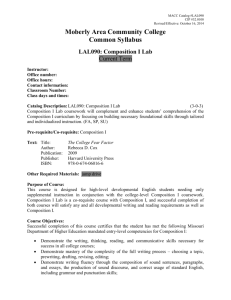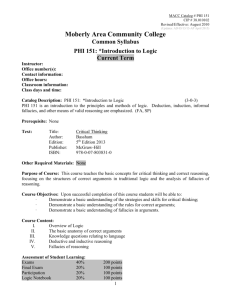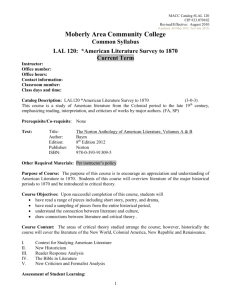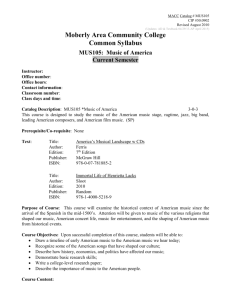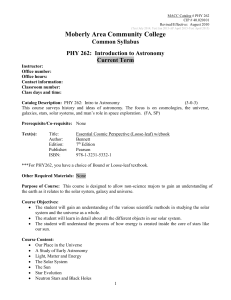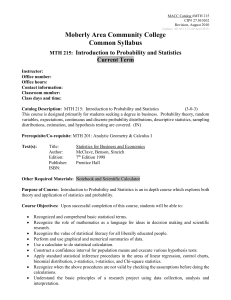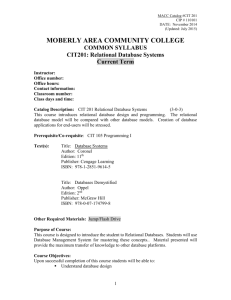PHI 150H Introduction to Philosophy Honors
advertisement
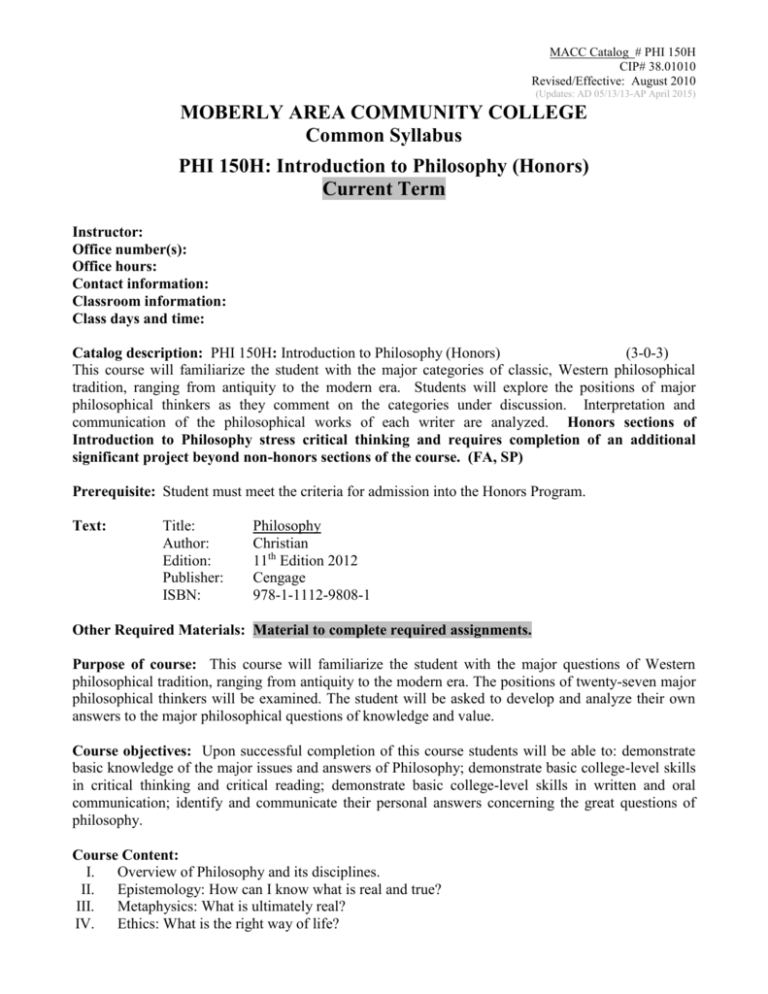
MACC Catalog # PHI 150H CIP# 38.01010 Revised/Effective: August 2010 (Updates: AD 05/13/13-AP April 2015) MOBERLY AREA COMMUNITY COLLEGE Common Syllabus PHI 150H: Introduction to Philosophy (Honors) Current Term Instructor: Office number(s): Office hours: Contact information: Classroom information: Class days and time: Catalog description: PHI 150H: Introduction to Philosophy (Honors) (3-0-3) This course will familiarize the student with the major categories of classic, Western philosophical tradition, ranging from antiquity to the modern era. Students will explore the positions of major philosophical thinkers as they comment on the categories under discussion. Interpretation and communication of the philosophical works of each writer are analyzed. Honors sections of Introduction to Philosophy stress critical thinking and requires completion of an additional significant project beyond non-honors sections of the course. (FA, SP) Prerequisite: Student must meet the criteria for admission into the Honors Program. Text: Title: Author: Edition: Publisher: ISBN: Philosophy Christian 11th Edition 2012 Cengage 978-1-1112-9808-1 Other Required Materials: Material to complete required assignments. Purpose of course: This course will familiarize the student with the major questions of Western philosophical tradition, ranging from antiquity to the modern era. The positions of twenty-seven major philosophical thinkers will be examined. The student will be asked to develop and analyze their own answers to the major philosophical questions of knowledge and value. Course objectives: Upon successful completion of this course students will be able to: demonstrate basic knowledge of the major issues and answers of Philosophy; demonstrate basic college-level skills in critical thinking and critical reading; demonstrate basic college-level skills in written and oral communication; identify and communicate their personal answers concerning the great questions of philosophy. Course Content: I. Overview of Philosophy and its disciplines. II. Epistemology: How can I know what is real and true? III. Metaphysics: What is ultimately real? IV. Ethics: What is the right way of life? MACC Catalog # PHI 150H CIP# 38.01010 Revised/Effective: August 2010 (Updates: AD 05/13/13-AP April 2015) V. VI. VII. VIII. Philosophy of Science: How does science affect world views? Personal Questions of Life, Death, Meaning & Purpose. The ideas of twenty-seven major thinkers. A Philosophy of Love Assessment of Student Learning: Exams 40% Final Exam 10% Participation 12% Research Paper 20% Who I Am Project 6% A Philosophy of Love 12% TOTAL 200 points 50 points 60 points 100 points 30 points 60 points 500 points A=450-500 D=300-349 B=400-449 C=350-399 F=Below 300 Exams will consist of objective and essay questions. The Final will be cumulative, closed-book & no aids. Participation will be based on quantity and quality of in-class participation. Attendance and instances of incisive questioning(IQ), demonstration of critical thinking (CT), supportive participation in Socratic dialogue(SD), sharing of personal views and life-stories(S) and class-preparedness(CP) will be noted as Excellent(E), Very Good(G), or Poor(P) in the Instructor=s grade sheets. Description of Major Assignments: Research Paper: Students will produce a paper which expresses their philosophy of life concerning five major philosophical questions: Where did I come from? Who am I? What is ultimately real and true and how do I know it? Do I have a purpose or meaning in life? Where am I going? The paper will include research on a major philosopher=s responses to the five major questions. The paper will be at least ten pages and in MLA MACC Catalog # PHI 150H CIP# 38.01010 Revised/Effective: August 2010 (Updates: AD 05/13/13-AP April 2015) Who I Am Project: Student will present the following in the semester: Collage B On poster board students will visually answer the question, A Who Am I?@ using pictures, drawings, mementos, cut-outs from magazines or other items. Tombstone with Epitaph B On the back of the poster board students will draw their tombstone, urn or other A resting place@ and put their name and epitaph thereon. Song B The student will select and present a one-minute rendition of a song which best represents their A philosophy of life. A Philosophy of Love Project. The student will create an Artifact B research paper, video, poem, musical composition , etc.-which answers the following questions: what is Love?; what is the metaphysics of Love?; how do I know Love is true?; what is the moral theory of Love; who is the wisest Lover? what is the future of Love? Statement to Connect Course with General Education Outcomes: In compliance with MACC’s General Education outcomes, the student who successfully completes this course will be able to: Demonstrate effective written and oral communication skills. Assess and appreciate artifacts in language, art, music, or philosophy and be able to evaluate those artifacts as representations of form, cultural context, and individual expressions. Instructor Policies: Academic Dishonesty: MACC board policy is as follows: “Academic dishonesty by students damages institutional credibility and unfairly jeopardizes honest students; therefore, it will not be tolerated in any form.” Forms of academic dishonesty include but are not limited to the following: violations of copyright law, plagiarism, fabrication, cheating, collusion, and other academic misconduct. Incidents of dishonesty regarding assignments, examinations, classroom/laboratory activities, and/or the submission of misleading or false information to the College will be treated seriously. The procedure for handling academic dishonesty is outlined in the Student Handbook (Policy Handbook M.010). In cases of alleged academic dishonesty, the burden of proof is on the student, not on the instructor. Attendance Policy: Any student who misses two consecutive weeks of class during a regular sixteenweek semester or the equivalent proportion of class time during a shorter session will be dropped from the class by the instructor unless acceptable justification is supplied. An instructor must complete and file the appropriate forms to drop the student within one week following the student’s violation of the attendance policy. Additionally, any student who misses more than one-fourth of the entire number of in-seat class meetings in a regular 16-week semester or the equivalent proportion of class time during a shorter session, may be dropped from that class by the instructor if, in the opinion of the instructor, the student does not have reasonable opportunity to succeed in the class. A student’s attendance rate will be calculated based upon the first day of the semester (not the student’s date of enrollment in the course.) Student attendance must be defined in a different manner for online, hybrid, and virtual courses. Student attendance in these courses is defined as active participation in the course. Online, hybrid, and virtual courses will, at a minimum, have weekly mechanisms for student participation, such as any or all of the following methods: MACC Catalog # PHI 150H CIP# 38.01010 Revised/Effective: August 2010 (Updates: AD 05/13/13-AP April 2015) a. Completion of quizzes or exams b. Submission of assignments c. Participation in threaded discussions d. Communication with the instructor A student who does not participate in an online, hybrid, or virtual course for two consecutive weeks will be dropped by the instructor unless acceptable justification is supplied. An instructor must complete and file the appropriate forms to drop the student within one week following the student’s violation of the attendance policy. As with ground courses, a student’s attendance rate in online courses will also be calculated based upon the first day of the semester. If a student does not demonstrate active participation in the online course within the first two weeks (or the equivalent proportion of class time during a short session), the student will be dropped as “never attended.” Simply logging into an online class does not constitute active participation. Students should be aware that their dropping a course and their last date of attendance in the course may impact their financial aid. (Policy Handbook I.090 and M.095) Tardiness: Per instructor’s policy Make-up and late work: Per instructor’s policy Extra-credit work: Per instructor’s policy MACC Catalog # PHI 150H CIP# 38.01010 Revised/Effective: August 2010 (Updates: AD 05/13/13-AP April 2015) Schedule of Student Assignments/Activities: Instructors will identify a Student Assignment/Activities schedule. Instructors have the prerogative to construct the schedule by class periods, weeks, or an overview of topics to be covered. ADA Statement Students who have disabilities that qualify under the Americans with Disabilities Act may register for assistance through the Office of Access and ADA Services. Students are invited to contact the Access Office to confidentially discuss disability information, academic accommodations, appropriate documentation and procedures. For more information, please call either the Moberly office at (660) 263-4100 x 11240 or the Columbia office at (573) 234-1067 x 12120, or visit our web page at http://www.macc.edu/index.php/services/access-office. Title IX Statement MACC maintains a strict policy prohibiting sexual misconduct in any form, including sexual harassment, sexual discrimination, and sexual violence. All MACC employees, including faculty members, are considered mandated reporters of sexual misconduct and as such are expected to contact the Title IX Coordinator when they become aware, in conversation or in writing, of an incident of sexual misconduct. For more information on this policy or to learn about support resources, please see http://www.macc.edu/sexual-misconduct-policy or contact Dr. Jackie Fischer, MACC’s Title IX Coordinator, at 660-263-4110, ext. 11236 or jackief@macc.edu. 3
